Program Brings Agricultural Scholars from Developing Countries to Earn Doctorate Degrees
The doctoral candidates study in America for three years before finishing their final year in their home country.
When he came to the Office of International Affairs (OIA) two years ago, Sukant Misra was part of a team with the goal of creating one integrated office that handled every aspect of Texas Tech University's global engagement in order to help comprehensively internationalize the campus.
Having done just that, the OIA is growing in reputation throughout the world, and a sure sign of that is the growth of a program that brings scholars from developing countries to Texas Tech to complete a doctorate degree and help solve food security and availability issues in their native lands.
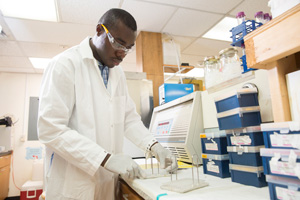
"Being an institution of higher education, we have to operate in a global context," said Misra, the associate vice provost for international programs. "We need to prepare our students to be operating in a global environment when they go out into the workforce, and they need to understand what the global issues are in the economy and society. The problems we're dealing with are both multidisciplinary and multinational in nature."
The Borlaug Higher Education for Agricultural Research and Development (BHEARD) program is named after Nobel Peace Prize winner Norman Borlaug with a goal of increasing the number of agricultural scientists and strengthening scientific institutions in developing countries. Texas Tech has been involved with the program for two years and saw its enrollment triple from the first year to the second.
"As an institution of higher education, we need to operate in a global context, and these types of programs allow our students to understand global issues and the faculty to work within that global challenge," Misra said. "Then all of us can be informed and be part of the global solution."
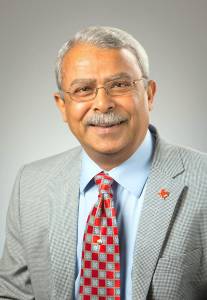
Dr. Sukant Misra
Coming to America
The BHEARD program was developed in 2013 at Michigan State University through a grant from the U.S. Agency for International Development (USAID) and the Association of Public Land-grant Universities (APLU). Texas Tech became involved in the program in 2014 when an open call was held by Michigan State for universities who wished to join the program.
With Texas Tech's strong background in agricultural education through the College of Agricultural Sciences and Natural Resources, it seemed the BHEARD program was a perfect fit. Of the 13 universities participating in the program, Texas Tech is the only non-land grant university.
But that has not stopped Texas Tech from being one of the leading universities in the program, growing from three students chosen to attend Texas Tech for the 2014-15 academic year to six additional students for 2015-16, and more anticipated for next fall.
"Obviously, Michigan State was very pleased with how we managed ourselves, how we responded to the needs of the program and how we delivered what we promised we were going to deliver," Misra said. "That's hugely important to Michigan State."
Scholars who apply to the BHEARD program come from Feed the Future countries, mostly African and Central American countries dealing with issues of food supply and security. Those selected are then paired with a faculty adviser in one of three departments – Agricultural Education and Communication, Agricultural and Applied Economics and Plant and Soil Science.
After three years pursuing their degree at Texas Tech, students return to their home country to finish their fourth year and earn their degree, and their Texas Tech faculty adviser travels to their home country for about 10 days during that fourth year to assist them.
Scholars wishing to study at an American university must have a master's degree and must meet the same rigorous admission standards as any other doctorate applicant to Texas Tech. In addition, scholars must score at least a 79 on the Test of English as a Foreign Language (TOEFL), which is a university requirement, though there are options to consider students who score below that mark if there are significant reasons to do so.
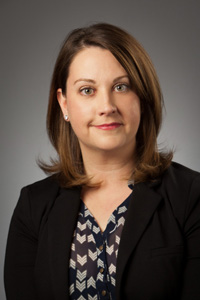
Reagan Ribordy
In the first two years of the program, Texas Tech has received more than $1.4 million from USAID to educate these students, which includes travel expenses, all educational costs, health insurance and housing. The students chosen for the program are hired as graduate research assistants.
Once Texas Tech was chosen to participate in the program, Reagan Ribordy, the senior grants administrator in the OIA's International Research and Development Division, became the point person responsible for Texas Tech's direction in BHEARD. She is responsible for putting together and submitting applications and matching potential scholars with appropriate faculty members.
She also has a strong relationship with the administrator of the program at Michigan State, which has further strengthened Texas Tech's standing within the program and allowed it to grow significantly from 2014 to 2015.
"Texas Tech is unique in the sense that we have that relationship on the front end to develop proposals and identify the proper faculty for the program," Ribordy said.
But it's an effort that involves the full Office of International Affairs. Once the students are chosen and arrive on campus, Alexa Smith, the assistant director for international enrollment development, becomes the students' contact person responsible for management of their affairs. Chris Lemmons, the international student life administrator, coordinates events and student organization activities for the students that help create a sense of community and build relationships with other students on campus.
"The students are outstanding on both an academic and personal level," Smith said. "It's really a pleasure to get to know them and to help them succeed during their time here at Texas Tech."

Chris Lemmons
Flexibility, expertise, competitiveness
When compared with some of the other schools in the country involved in the program, the fact Texas Tech has nine students, having doubled its total number of students each of the past two years, is quite impressive.
According to Misra, only a handful of schools outside of host Michigan State get more than one or two students. That puts Texas Tech ahead of such prestigious company such as Ohio State, Washington State, Florida, Louisiana State, Kansas State, Virginia Tech and others.
"That's extremely important for us as an academic institution to educate and graduate more doctoral students," Misra said.
Misra credited Texas Tech's early success and growth within the program to several factors Michigan State looks at when considering schools for the program.
- Competitiveness of the doctorate programs: "If there is a need for a student to go to a program, say in agricultural economics, they look for an agricultural economics program that has some national recognition," Misra said.
- Experience and expertise of the faculty adviser: Misra said this is important to Michigan State because they want to match students with people who have recognizable expertise in certain areas. The faculty members also derive an added benefit in that it helps them make contacts in foreign countries that allow them to develop more collaborations for research. "It speaks volumes to our faculty being picked to advise these international scholars," Misra said.
- Flexibility: Universities who wish to be a part of this program have to be somewhat flexible because some deadlines within the program don't always mesh well with Texas Tech's deadlines, such as application and reporting deadlines. Misra said that is one of the reasons Texas Tech received just three students the first year. "We're not going to compromise quality, we just have to agree to be a little bit flexible so we can put together the pieces and match with the students," Misra said. "After matching is done, the students have to be able to come here very quickly."
- Delivery: After all the other three criteria are passed, Texas Tech still has to deliver what it says it can, from admitting the students to ensuring quality faculty advice to enhancing the student's experience both at Texas Tech and in the United States in general. Seeing what Texas Tech delivered, Misra feels that is a big reason its second class of BHEARD students jumped from three to six.
Education with a purpose
A big component to the program is having the students spend their fourth year earning their doctorate in their home country. That allows them to get a head start on tackling the problem for which they are earning their degree in the first place.
Theophilus Tengey entered the program in the 2014 class and is earning a degree in plant and soil science with the hope of solving the food security problems faced by developing countries, such as his native Ghana.
"I chose to study crop science, specifically with a research focus on plant breeding and genetics, because there are few experts in this area to solve the many problems faced by farmers in my country," Tengey said. "Availability of experts in this area will help keep farmers in business as high-yielding, adaptable crop varieties will be made available for production.
"I also want to develop new technologies such as disease- and insect-resistant crop varieties that will discourage the use of pesticides, which pose serious health and environmental hazards."
Tengey's adviser, assistant professor Venugopal Mendu, said he has found the students in the program to be highly motivated to learn science and novel technologies and easily adaptable to their new environment.
"Since we have an international environment at Texas Tech, it was not very difficult for the students to get adapted to live at Texas Tech," Mendu said. "They have quickly adjusted to the academic and personal life at Texas Tech."
Assistant professor Amy Boren, another adviser in the program, echoed Mendu's sentiments about the passion for learning from these students.
"I have found the sense of purpose in my BHEARD student is very strong," Boren said. "She knows what impact she wants to have on her home country and my job is to help her make that happen. I think the program could become quite successful here at Texas Tech, not only because of the committed faculty but also because the OIA provides such wonderful support to us and to our students."
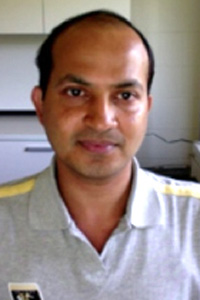
Venugopal Mendu
Boren's student, Cheryl Williams, an agricultural education and communication candidate from Liberia, said the BHEARD program has given her the opportunity to fulfill a lifelong dream of studying abroad that she might not have had otherwise.
"I want to contribute to the development and training of young scientists in Liberia so, together, we can sensitize the public on the utilization of food for nutrition security," Williams said. "The BHEARD program offered a great opportunity, which I seized.
"I am to contribute to the body of knowledge in the country and collaborate with other national, regional and global researchers to boost the Liberian agricultural sector and transfer knowledge to young and upcoming scientists in the country."
Misra said with the success students at Texas Tech have already shown in a short period of time, he is confident the 2016-17 class of BHEARD students could reach an additional seven or eight coming to Texas Tech.
"This program is not going away," Misra said. "Given what we've seen so far and what the faculty interested in the program have seen, and that Michigan State is pleased with what we have done and what we can do, we hope to continue to grow this program, and that comes with dollars that strengthens our research enterprise."
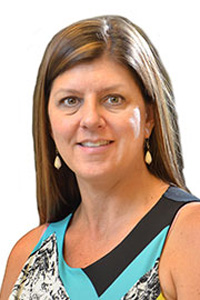
Amy Boren
International Affairs
-
Address
601 Indiana Avenue, Lubbock, TX 79409-5004 -
Phone
806.742.3667 -
Email
oia.reception@ttu.edu
